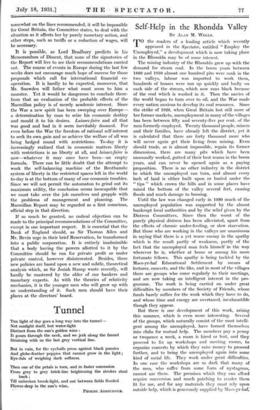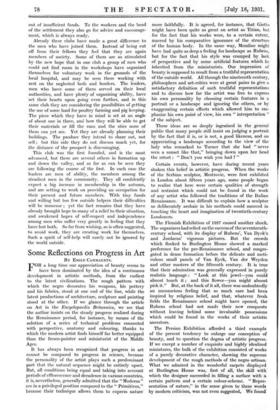Self - Help in the Rhondda Valley
BY ALAN M. WELLS.
TO the readers of a leading article which recently appeared in the Spectator, entitled " Employ the Unemployed," a development which is now taking place in the Rhondda may be of some interest.
The mining industry of the Rhondda grew up with the demand for steam coal. In the boom years between 1880 and 1910 almost one hundred pits were sunk in the two valleys, labour was imported to work them, hundreds of houses were run up quickly and badly on each side of the stream, which now runs black because of the coal which is washed in it. Then the navies of the world began to turn over to oil, and the War made every nation anxious to develop its coal resources. Since the strike of 1926, when Great Britain lost still more of her former'markets, unemployment in many of the villages has been between fifty and seventy-five per cent. of the men formerly employed. Twenty thousand people, miners and their families, have already left the district, yet it is calculated that there are forty thousand more who will never again get their living from mining. Even should trade, as is almost impossible, regain its former dimensions, there are many pits which have been unsoundly worked, gutted of their best seams in the boom years, and can never be opened again as a paying proposition. There is no other industry in the district to which the unemployed can turn, and almost every inch of laud is either built upon or buried under the " tips " which crown the hills and in some places have raised the bottom of the valley several feet, causing floods and much damage to housing.
Until the law was changed early in 1980 much of the unemployed population was supported by the almost bankrupt local authorities and by the relief given by the Distress Committees. Since then the worst of the purely physical distress has been alleviated, apart from the effects of chronic under-feeding, or slow starvation. But those who are working in the valleys are unanimous in saying that there is a yet worse enemy in the apathy which is the result partly of weakness, partly of the fact that the unemployed man feels himself in the way wherever he is, whether at home or among his more fortunate fellows. This apathy is being tackled by the Maes-yr-haf Educational Settlement by means of lectures, concerts, and the like, and in most of the villages there are groups who come regularly to their meetings, and are now taking an intelligent interest in the pro- gramme. The work is being carried on under great difficulties by members of the Society of Friends, whose funds barely suffice for the work which they have to do, and whose time and energy are overtaxed, inexhaustible though they appear.
But there is one development of this work, arising this summer, which is even more interesting. Several of the groups, which naturally consist of the most intelli- gent among the unemployed, have formed themselves into clubs for mutual help. The members pay a penny or twopence a week, a room is hired or lent, and they proceed to fix up workshops and meeting rooms, to organize concerts by which they raise money to proceed further, and to bring the unemployed again into some kind of social life. They work under great difficulties. In one case the workshops are so dark that many of the men, who suffer from some form of nystagmus, cannot use them. The premises which they can afford require conversion and much patching to render them fit for use, and foi any materials they must rely upon outside help, which is generously supplied by Macs-yr-hat' out of insufficient funds. To the workers and the head of the settlement they also go for advice and encourage- ment, which is always ready., Already these clubs have made a great difference to the men who have joined them. Instead of being cut off from their fellows they feel that they are again members of society. Some of them are so stimulated by the new hope that in one club a group of men who could not find room in the workshops have organized themselves for voluntary work in the grounds of the local hospital, and may be seen there working with zest on the neglected beds and borders. The leaders, men who have some of them served on their local authorities, and have plenty of organizing ability, have set their hearts upon going even further, and in this same club they are considering the possibilities of getting the use of some land for poultry farming and pig keeping. The piece which they have in mind is set at an angle of about one in three, and how they will be able to get their materials or fill the runs and the sties none of them can yet see. Yet they are already planning their buildings. The produce they intend to share out, not sell ; but this side they do not discuss much yet, for the distance of the prospect is discouraging.
This club was the first founded, and is the most advanced, but there are several others in formation up and down the valley, and as far as can be seen they are following, the course of the first. In each ease the leaders are men of ability, the members among the steadiest men in the community. They all confidently expect a big increase in membership in the autumn, and are setting to work on providing an occupation for their present and future members. With tiny funds and willing but too few outside helpers their difficulties will be immense; yet the fact remains that they have already brought hope to many of a relief to their situation, and awakened hopes of self-respect and independence among men who suffer very greatly in feeling that they have lost both. So far from wishing, as is often suggested, to avoid work, they are creating work for themselves. Such a spirit of self-help will surely, not be ignored by the world outside.



































 Previous page
Previous page